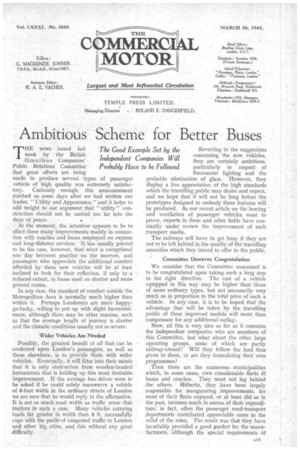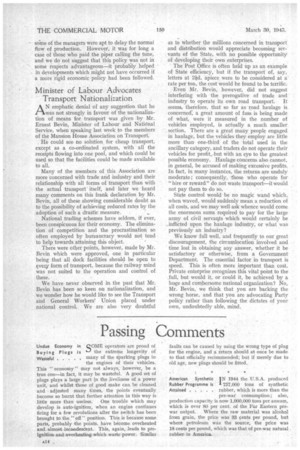Ambitious Scheme for Better Buses
Page 15

Page 16

If you've noticed an error in this article please click here to report it so we can fix it.
THE news issued last week by the British The Good Example Set by the Omnibus Companies' Independent Companies Will Public Relations Committee Probably Have to be Followed that great efforts are being made to produce several types of passenger vehicle of high quality was extremely satisfactory. Curiously enough, this announcement reached us some days after we had written our leader, " Utility and Appearance," and it helps to add weight to our argument that "utility" construction should not be carried too far into the days of peace.
At the moment, the intention appears to be to effect these many improvements mainly in connection with coaches and buses employed on express and long-distance services. It has usually proved to be the case, however, that what is exceptional one day becomes practice on the morrow, and passengers who appreciate the additional comfort afforded by these new vehicles will be at least inclined to look for their reflection, if only to a reduced extent, in buses used on shorter and more general routes.
• In any case, the standard of comfort outside the Metropolitan Area is normally much higher than within it. Perhaps Londoners are more happygo-lucky, willing to put up with slight inconveniences, although there may be other reasons, such as that the average length of journey is shorter and the climatic conditions usually not so severe.
Wider Vehicles Are Needed Possibly, the greatest benefit of all that can be conferred upon London's passengers, as well as those elsewhere, is to provide them with wider vehicles. Eventually, it will filter into their minds that it is only obstruction from wooden-headed bureaucrats that is holding up this most desirable improvement. If the average bus driver were to be asked if he could safely manoeuvre a vehicle of 8-foot width in the ordinary streets of London we are sure that he would reply in the affirmative. It is not so much road width as traffic sense that matters in such a case. Many vehicles carrying loads far greater in width than 8 ft. successfully cope with the perils ofcongested traffic in London and other big cities, and this without any great difficulty. Reverting to the suggestions concerning the new, vehicles, they are certainly ambitious, particularly in respect of fluorescent lighting and the probable elimination of glass. However, they display a live appreciation of the high standards which the travelling public may desire and expect, and we hope that it will not be long before the prototypes designed to embody these features will be produced. As our recent article on the heating and ventilation of passenger vehicles went to prove, experts in these and other fields have constantly under review the improvement of such transport media.
The railways will have to get busy if they are not to be left behind in the quality of the travelling amenities which they intend to offer to the public.
Committee Deserves Congratulation We consider that the Committee concerned is to be congratulated upon taking such a long step in. the right direction. The cost of a vehicle equipped in this way may be higher than those of more ordinary types, but not necessarily very much so in proportion to the total price of such a vehicle. In any case, it is to be hoped that the advantage that will be taken by the travelling public of these improved models will more than compensate for any additional outlay.
Now, all this is very nice so far as it concerns the independent companies who are members of this Committee, but what about the other large operating groups, some of which are partly railway-owned? Will they follow the lead thus given to them, or are they formulating their own programmes?
Then there are the numerous municipalities which, in some cases, own considerable fleets 6f buses and coaches. They must not lag behind • the others. Hitherto, they have been largely • responsible for inaugurating improvements, for • most of their fleets enjoyed, or at least did so in the past, incomes much in excess of their expenditure; in fact, often the passenger road-transport • departments contributed appreciable sums to the relief of the rates. The result was that they, have invariably provided a good market for the manufacturers, although the special requirements. of sdme of the managers were apt to delay the normal flow of production. However, it was for long a case of those who paid the piper calling the tune, and we do not suggest that this policy was not in some respects advantageous—it probably helped in developments which might not have occurred if a more rigid economic policy had been followed.
Minister of Labour Advocates Transport Nationalization •.
AA N emphatic denial of any suggestion that he .iwas not strongly in favour of the nationalization of means for transport was given by Mr. Ernest Sevin, Minister of Labour and NatiOnal Service, when speaking last week to the members of the Mansion House Association on Transport.
. He could see no solution for cheap transport, except as a co-ordinated system, with all the receipts flowing into one pool, and which could he used so that the facilities could be made available to all.
Many of the members of this Association are more concerned with trade and industry and their relationship with all forms of transport than with the actual transport itself, and later we heard many comments on this frank declaration by Mr. Bevin, all of these showing considerable doubt as to the possibility of achieving reduced rates by the adoption of such a drastic measure.
National trading schemes have seldom, if ever, been cor4icuous for their economy. The elimination of competition and the procrastination so 'often employed by bureaucracy would not tend to help towards attaining this object.
There were other points, however, made by Mr. Bevin which were approved, one in particular being that all dock facilities should be open to every form of transport, because the 'railway mind was not suited to the operation and control of these.
We have never observed in. the past that Mr. Bevin has been so keen on nationalization, and we wonder how he would like to see the Transport and General Workers' Union placed under national control. We are also very doubtful as to whether the millions concerned in transport and distribution would appreciate becoming servants of the State, with no possible Opportunity of developing their own .enterprises.
The Post Office is often held up as an example of State efficiency, but if the transport of, say, letters at 21c1. apiece were to be considered at rate per ton, the cost would be found to be terrific.
Even Mr. Bevin, however, did not suggest interfering with the prerogative of trade and industry to operate its own road transport. It seems, therefore, that so far as road haulage is concerned', a great amount of fuss is being made of what, were it measured in the number of vehicles employed, is actually a much smaller section. There are a great many people engaged in haulage, but the vehicles they employ are little more than one-third of the total used in the ancillary category, and traders do not operate their vehicles for profit,..but with an eye to the greatest possible economy. Haulage concerns also cannot, in general, be accused of making excessive profits. In fact, in many instances, the returns are unduly moderate; consequently, those who operate for "hire or reward" do not waste transport—it would not pay them to do so.
State control would be no magic wand which, when waved, would suddenly mean a reduction of all costs, and we may well ask whence would come the enormous sums required to pay for the large army of civil serval:Its which would certainly be inflicted upon the haulage industry, or what was previously an industry?
We know full well, and frequently to our great discouragement, the circumlocution involved and time lost in obtaining any answer, whether it be satisfactory or otherwise, from a Government Department. The essential factor in transport is speed. This is often more important than cost. Private enterprise recognizes this vital point to the full, but would it, or could it, be achieved by a huge and cumbersome national organization? No, Mr. Sevin, we think that you are backing the wrong horse, and that you are advocating Party policy rather than following the dictates of your own, undoubtedly able, mind.




















































